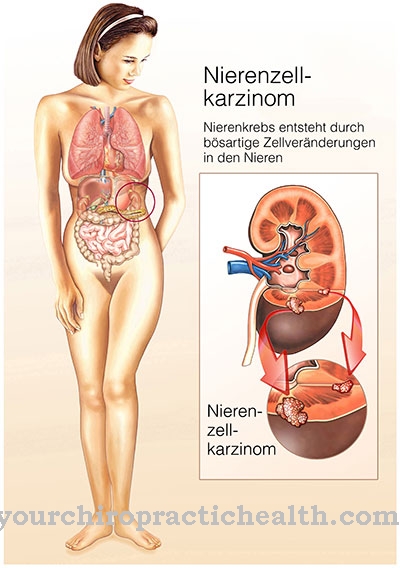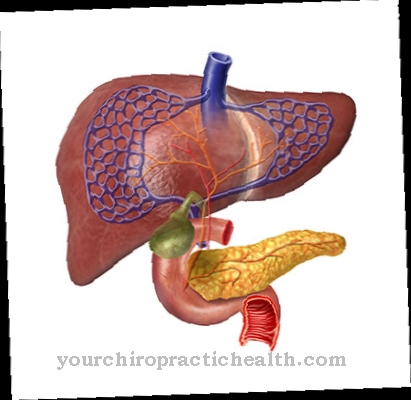A Heart failure, Heart failure or Heart failure is a mostly irreversible disorder and disease of the heart. In particular, the bloodstream suffers from heart failure. As a result, there is no longer enough blood available for the organs. Difficulty breathing, tiredness and general weakness, as well as water retention are typical signs of heart failure.
What is heart failure?

© bilderzwerg - stock.adobe.com
Every year around 295 out of 100,000 women and 380 out of 100,000 men develop heart failure in Germany. The average age at onset of the disease is between 70 and 80 years for both sexes. Certain forms of heart failure can also occur at an earlier age. With this disease, the heart muscle is usually weakened, which affects the heart's pumping function.
Therefore, the amount of blood required by the organism for optimal blood flow in the tissue cannot be guaranteed. A distinction is made between left heart failure and right heart failure, which have different symptoms that are typical for the disease. If both halves of the heart are affected, one speaks of global insufficiency.
The most common symptom of left heart failure is shortness of breath (dyspnoea). In the initial stage, it only occurs during physical exertion, but also when the disease progresses. This shortness of breath can intensify when you lie down and lead to nighttime attacks, which is popularly known as "cardiac asthma". Another symptom of left heart failure is water retention in the lungs, which leads to gurgling background noises when breathing.
With right heart failure, this water retention occurs in the abdomen (ascites) and the legs (leg edema). This water retention is partly excreted by the kidneys at night, so that frequent nocturnal urination (nocturia) is another typical symptom, as is the patient's weight gain due to the water retention.
A basic distinction is made between a chronic and an acute form of heart failure. The acute form occurs within a few hours or days. The chronic form, on the other hand, takes months or years. Left and right heart failure can be acute or chronic.
causes
The list of causes for the occurrence of heart failure is quite extensive: atherosclerosis of the coronary arteries is the most common of all causes, followed by high blood pressure, heart muscle diseases, heart muscle inflammation, cardiac arrhythmias, heart valve abnormalities, pericardial effusion and the associated constriction of the pericardium and metabolic diseases. Tachycardias and bradycardias (heart rate that is too fast and too slow) are often the cause of acute heart failure.
Symptoms, ailments & signs
The signs and symptoms that cause heart failure depend on whether it is acute or chronic. Possible symptoms of acute heart failure are coughing and severe shortness of breath; the breath can sound rattling. Affected people also have an unusually fast heartbeat, and in isolated cases cardiac arrhythmias occur.
Outwardly, a heart failure can be recognized by the pale skin and recurring sweats.The symptoms usually appear suddenly and worsen within a short time. Acute heart failure is a medical emergency and must be treated immediately. The chronic heart failure usually develops slowly.
The patient first notices a decrease in performance and feels exhausted and tired more quickly. Breathlessness usually occurs even with light physical exertion. Edema is another warning sign. These fluid accumulations occur mainly in the legs and increase in size as the disease progresses.
In the advanced stages of heart failure, the edema causes an increased need to urinate at night. Affected people also often gain weight without changing their eating habits. Chronic heart failure often develops over years and in the best case scenario is recognized and treated early.
course
The course of a heart failure is largely determined by the underlying cause and the severity.
For almost all of the causes mentioned above, a progressive deterioration must be expected. Any drug therapy that becomes necessary can slow down this process, but not reverse it.
If the degree of severity is high, the patient also suffers from a drastic impairment of quality of life and reduced life expectancy, since the mortality rate (death rate) in heart failure is high.
In this context, adequate medication to compensate for heart failure is a life-prolonging measure. The prognosis can continue to improve with a healthy lifestyle and regular medical check-ups.
Complications
Heart failure can cause serious complications that, in the worst case scenario, can result in death. This applies primarily to an untreated heart failure. There is a risk of severe cardiac arrhythmias, which in the further course can trigger sudden cardiac death. The countermeasures are no longer sufficient to compensate for the reduced cardiac output.
If an acutely decompensated heart failure occurs, the patient is threatened with shock. As a result, blood pressure drops, with the risk of failure of the circulatory system or of vital organs. For example, it is possible that the decompensated heart failure is causing sudden heart failure. In addition to the cardiac arrhythmias already described, inflammation of the heart muscle (myocarditis) or a heart attack are possible triggers.
In the case of advanced heart failure, the person's heart may stop beating suddenly, which is not uncommon with a heart attack. Another threatening complication of heart failure is the development of a blood clot (thrombosis). This in turn threatens other life-threatening sequelae such as a stroke or pulmonary embolism.
In some cases, heart failure can have other effects, such as pulmonary edema or sleep apnea syndrome. Sleep apnea syndrome refers to paused breathing while sleeping. These dropouts usually appear at night and place additional stress on the cardiovascular system. Another conceivable risk factor for chronic heart failure is being underweight.
When should you go to the doctor?
If breathlessness, hyperventilation and swelling are noticed again and again, the cause may be heart failure. A doctor should be consulted if the symptoms do not go away on their own or if further symptoms occur. If, for example, there is persistent inner restlessness, the family doctor must be informed. Water retention, abnormal breathing noises and loss of appetite are also clear warning signs. If the physical performance decreases rapidly, a doctor's visit is recommended.
This is especially true if serious problems arise during everyday stress and simple activities such as climbing stairs can no longer be managed. Medical advice must be obtained at the latest when edema forms on the lower legs. If the heart palpitations persist, a doctor must also be consulted immediately.
The same applies to sharp pains in the heart area and persistent breathing difficulties when lying down. In addition to the family doctor, the cardiologist is the right contact. In the event of severe symptoms, the person affected should immediately go to the nearest hospital or call the emergency doctor.
Doctors & therapists in your area
Treatment & Therapy
The first step in treating heart failure is to eliminate the underlying cause. This can be done with drugs or surgically. Is there e.g. If you have a heart valve defect, surgical intervention to repair the defect is indicated. If the cause is increased blood pressure, then the prescription of antihypertensive drugs is necessary.
Patients with coronary heart disease are treated surgically (e.g. bypass surgery) and medication (nitrates, beta blockers, ACE blockers). Diuretics are prescribed for water retention, as well as digitalis glycosides for atrial fibrillation and antiarrhythmics for cardiac arrhythmias.
In addition to therapy, most patients require moderate exertion and physical exercise to strengthen the ailing heart muscle. In the case of severe heart failure, the last option is a heart transplant.
Outlook & forecast
The prognosis for heart failure is poor overall. Around half of all those affected die within five years of being diagnosed. Acute heart failure usually occurs as a result of heart failure. Men are slightly more susceptible to possible death from heart failure than women. In about 97 percent of the cases, those affected also suffer from another disease.
Those affected by heart failure also have the opportunity to improve their prognosis. The decisive factors here are adherence to therapy and the willingness to change one's lifestyle. Basically, the mean survival time can be increased despite heart failure by avoiding risk factors. Above all, this includes avoiding alcohol, tobacco and foods that are too fatty. Moderate exercise can also help maintain heart health.
Adherence to therapy primarily refers to the regular use of medication and regular heart checks. Despite the possible lack of symptoms, drug therapy can contribute to a longer life. If therapy is not used, those affected risk a sudden worsening of the heart failure.
Patients who experience the typical symptoms of heart failure even at rest also have an annual survival rate of only 50 percent.
Aftercare
In the follow-up care for heart failure, it is first important to take general measures to avoid further damage to the heart. Especially the adjustment of the lifestyle is of great importance for a good long-term prognosis. First and foremost, alcohol and nicotine should be avoided. In addition, weight reduction should be aimed for in overweight patients.
Light physical activity improves endurance, quality of life and resilience in the case of heart failure. An optimal training program can take place, for example, as part of an outpatient cardiac sports group. Furthermore, drug therapy is a central component of the aftercare program. Here it is important to relieve the heart in its pumping activity.
By lowering the preload and afterload, the demands of the circulatory system are adapted to the capabilities of the heart. Medicines that are often used are beta blockers, which lower the heart rate and the oxygen consumption of the heart, as well as ACE inhibitors, which reduce the afterload in the circulatory system and limit the fibrotic remodeling of the heart muscle.
These prescription drugs must be prescribed by a doctor and the current dose checked regularly. In addition, regular follow-up checks with an accompanying re-evaluation of the disease must be carried out as part of the follow-up care. Suitable measures are echocardiography, electrocardiography, chest x-ray examination and laboratory tests for heart failure markers.
You can do that yourself
People with heart failure should keep exercising, but pay more attention to signs that the body has, such as breathlessness. This symptom often occurs in heart failure. Therefore, regular recovery phases should be planned for the activities.
For example, the person concerned can take regular breaks from a walk and sit on a bench. It is also important that the person concerned does not put himself under time pressure to complete a certain activity in the shortest possible time. Difficulty breathing can also occur when lying flat in bed.
The patient can improve breathing by raising the head with an additional pillow or by adjusting the bed, if possible. Getting out of bed in the morning should be done slowly and calmly as heart failure patients often experience dizziness. Getting up slowly, accompanied by light physical exercise, helps the patient avoid feeling dizzy when standing up.
Another problem with heart failure is the appearance of swelling. These can be improved by eating low-salt foods. In addition, those affected can develop depression due to the fact that they are restricted in their everyday life. This should then be treated by a psychotherapist.


.jpg)





















.jpg)



